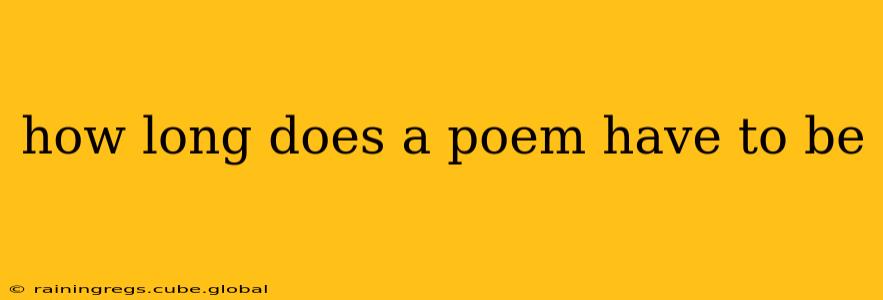The question of a poem's minimum or maximum length is deceptively simple. The short answer is: there's no set length. A poem can be as short as a single word or as long as an epic spanning thousands of lines. The true measure isn't the number of words or lines, but the impact and artistry within.
This deceptively simple answer, however, belies a deeper exploration of what defines a poem and the various factors that influence its length. Let's delve into some key considerations:
What Defines a Poem?
Before discussing length, let's clarify what constitutes a poem. At its core, a poem is a form of literary art that uses aesthetic and rhythmic qualities of language—such as sound symbolism, imagery, and figurative language—to evoke meanings in addition to, or in place of, a literal interpretation. This definition leaves plenty of room for diverse lengths and forms.
Exploring Different Poetic Forms and Their Lengths
Many poetic forms are associated with specific length constraints, but these are guidelines, not hard and fast rules.
- Haiku: Traditionally, a haiku consists of three lines with a 5-7-5 syllable structure. However, modern haiku often deviate from this structure, focusing more on the image and feeling evoked.
- Sonnet: A sonnet typically consists of 14 lines, following a specific rhyme scheme and meter (usually iambic pentameter). Variations exist, such as the Shakespearean (English) sonnet and the Petrarchan (Italian) sonnet.
- Limerick: A limerick is a five-line poem with a specific AABBA rhyme scheme and a characteristic rhythm. Its length is relatively fixed.
- Free Verse: Free verse poems are unbound by traditional metrical patterns and rhyme schemes. Their length is entirely determined by the poet's vision.
Why Length Isn't the Defining Factor
The effectiveness of a poem isn't determined by its word count. A short, powerful poem can be incredibly moving, just as a long, sprawling epic can captivate readers for hours. Consider these examples:
- "The Road Not Taken" by Robert Frost: This relatively short poem has sparked countless interpretations and continues to resonate with readers.
- "The Odyssey" by Homer: This epic poem spans thousands of lines, showcasing a grand narrative over many years.
Both are masterpieces, yet their lengths differ dramatically. The crucial element is not length but the skillful use of language, imagery, and structure to convey meaning and emotion.
H2: How long should my poem be?
The best length for your poem depends entirely on your vision and the story you wish to tell. Consider these factors:
- Your subject matter: A complex topic might require a longer poem to adequately explore its nuances. A simple, concise observation might be perfectly expressed in a few lines.
- Your style: Some poets prefer brevity, while others embrace expansive narratives.
- Your intended audience: Consider if your audience is more likely to appreciate a short, focused poem or a longer, more elaborate one.
H2: What if my poem is too short or too long?
There is no such thing as a poem being “too short.” If your poem effectively communicates its intended message in a few lines, that’s perfectly acceptable. Similarly, a longer poem that maintains its momentum and interest is equally valid. If you feel your work is too long or too short, revise it until it feels right. Trust your artistic instincts.
Conclusion:
Ultimately, the length of a poem is less important than its artistry and impact. Whether a single word, a short verse, or an epic narrative, the power of a poem lies in its ability to connect with the reader on an emotional and intellectual level. Experiment, explore different forms, and let your creativity guide you in crafting poems of any length that resonate with your unique voice.
